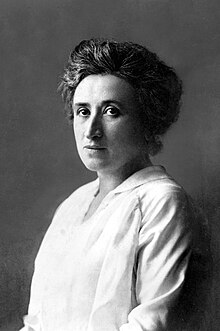
Back Rosa Luxemburg Afrikaans Rosa Luxemburg ALS Rosa Luxemburgo AN रोज़ा लक्सेम्बर्ग़ ANP روزا لوكسمبورغ Arabic روزا لوكسيمبورج ARZ Rosa Luxemburg AST Rosa Luxemburg AVK रोजा लक्सेम्बर्ग़ AWA Rosa Luxemburg Aymara
Rosa Luxemburg | |
|---|---|
 Luxemburg, c. 1895–1905 | |
| Born | Rozalia Luksenburg 5 March 1871 Zamość, Congress Poland, Russian Empire |
| Died | 15 January 1919 (aged 47) |
| Cause of death | Execution by shooting |
| Alma mater | University of Zurich (Dr. jur., 1897) |
| Occupations |
|
| Political party |
|
| Spouse |
Gustav Lübeck
(m. 1897, divorced) |
| Partners | |
| Parent(s) | Edward Eliasz Luksenburg Lina Lewensztejn |
| Relatives | de:Nathan Löwenstein von Opoka (cousin) |
| Signature | |
| Part of a series about |
| Imperialism studies |
|---|
 |
| Part of a series on |
| Marxism |
|---|
 |
Rosa Luxemburg (Polish: Róża Luksemburg, [ˈruʐa ˈluksɛmburk] ⓘ; German: [ˈʁoːza ˈlʊksm̩bʊʁk] ⓘ; born Rozalia Luksenburg; 5 March 1871 – 15 January 1919) was a Polish and naturalised-German revolutionary socialist, orthodox Marxist, and anti-War activist during the First World War. She became a key figure of the revolutionary socialist movements of Poland and Germany during the late 19th and early 20th century, particularly the Spartacist uprising.
Born and raised in a secular Jewish family in Congress Poland, she became a German citizen in 1897. The same year, she was awarded a Doctor of Law in political economy from the University of Zurich, becoming one of the first women in Europe to do so. Successively, she was a member of the Proletariat party, the Social Democracy of the Kingdom of Poland and Lithuania (SDKPiL), the Social Democratic Party of Germany (SPD), the Independent Social Democratic Party (USPD), the Spartacus League (Spartakusbund), and the Communist Party of Germany (KPD).
After the SPD supported German involvement in World War I in 1915, Luxemburg and Karl Liebknecht co-founded the anti-war Spartacus League which eventually became the KPD. During the November Revolution, she co-founded the newspaper Die Rote Fahne (The Red Flag), the central organ of the Spartacist movement. Luxemburg considered the Spartacist uprising of January 1919 a blunder,[1] but supported the attempted overthrow of the SPD-ruled Weimar Republic and rejected any attempt at a negotiated solution. Friedrich Ebert's SPD Cabinet crushed the revolt and the Spartakusbund by sending in the Freikorps, government-sponsored paramilitary groups consisting mostly of battle-hardened World War I veterans of the Imperial German Army. Freikorps troops captured, tortured and executed[2] Luxemburg and Liebknecht during the rebellion.[3]
Due to her pointed criticism of both the Leninist and the more moderate social democratic schools of Marxism, Luxemburg has always had a somewhat ambivalent reception among scholars and theorists of the political left.[4] Nonetheless, Luxemburg and Liebknecht were extensively idolised as communist martyrs by the East German communist government.[5] The German Federal Office for the Protection of the Constitution (BVS) asserts that idolization of Luxemburg and Liebknecht is an important tradition of the 21st-century German far-left.[5] Despite her own Polish nationality and strong ties to Polish culture, opposition from the Polish Socialist Party due to her stance against the 1918 independence of the Second Polish Republic and later criticism from Stalinists have made her a controversial historical figure in the present-day political discourse of the Third Polish Republic.[6][7][8]
- ^ Frederik Hetmann: Rosa Luxemburg. Ein Leben für die Freiheit, p. 308.
- ^ Feigel, Lara (9 January 2019). "The Murder of Rosa Luxemburg review – tragedy and farce". The Guardian. Archived from the original on 15 January 2019. Retrieved 12 July 2022.
- ^ Christian (15 January 2023). "Cinco obras de Rosa Luxemburgo para recordar su legado" [Five works by Rosa Luxemburg to remember her legacy]. Tercera Información (in Spanish). Retrieved 16 January 2023.
- ^ Leszek Kołakowski ([1981], 2008), Main Currents of Marxism, Vol. 2: The Golden Age, W. W. Norton & Company, Ch III: "Rosa Luxemburg and the Revolutionary Left".
- ^ a b Gedenken an Rosa Luxemburg und Karl Liebknecht – ein Traditionselement des deutschen Linksextremismus [Commemoration of Rosa Luxemburg and Karl Liebknecht – a traditional element of German left-wing extremism] (PDF). BfV-Themenreihe (in German). Cologne: Federal Office for the Protection of the Constitution. 2008. Archived from the original (PDF) on 13 December 2017.
- ^ Tych, Feliks (2018). "Przedmowa" [Preface]. In Wielgosz, Przemysław (ed.). O rewolucji: 1905, 1917 [On revolution: 1905, 1917] (in Polish). Instytut Wydawniczy "Książka i Prasa". pp. 7–29. ISBN 978-8365304599.
- ^ Cite error: The named reference
winklerwas invoked but never defined (see the help page). - ^ Cite error: The named reference
damianwas invoked but never defined (see the help page).
© MMXXIII Rich X Search. We shall prevail. All rights reserved. Rich X Search